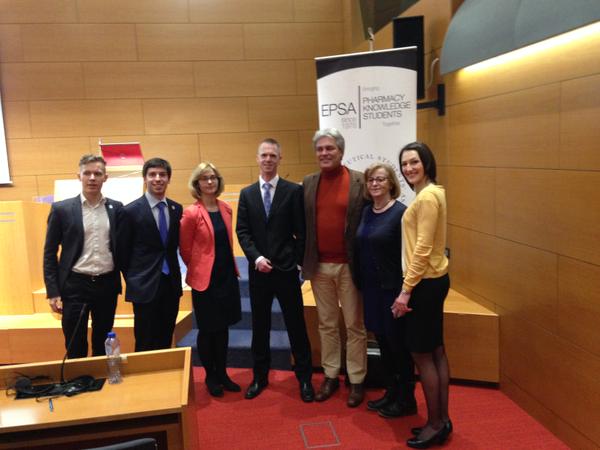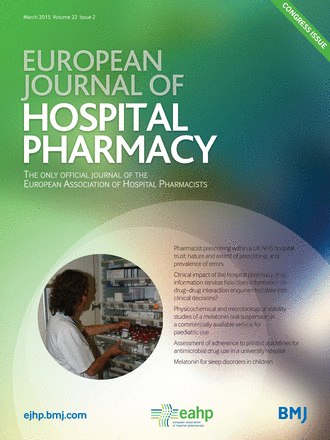 The EAHP EU Monitor is a regular round up of news relevant to hospital pharmacy in Europe.
The EAHP EU Monitor is a regular round up of news relevant to hospital pharmacy in Europe.
You can subscribe to receive the EAHP EU Monitor by email here.
EAHP respond to European Commission Working Time Directive consultation
 The European Association of Hospital Pharmacists has responded to a European Commission consultation on the potential scope for improvements to the European Working Time Directive and the arrangements for its implementation.
The European Association of Hospital Pharmacists has responded to a European Commission consultation on the potential scope for improvements to the European Working Time Directive and the arrangements for its implementation.
In its response EAHP emphasized:
-
Its support for the principle of working time regulation, an important aspect in protecting patient safety and welfare and enabling workers to reconcile work and private life
-
The need for a balanced, careful and flexible approach in application in respect of understanding the both the challenges in, and important need for, providing 24/7 hospital services
-
The impacts the working time directive can have in respect of health professional training, which should be a matter considered within the Commission’s ongoing review activity
EAHP supported activity to improve the legal clarity and understanding in respect of how on-call and standby time should be treated in respect of the Directive, and suggested local agreement supported by well developed European guidance be utilized as a means of achieving this.
EAHP expressed its view that immediate granting of compensatory rest should always be preferable, but realities of staffing within hospitals could require an element of flexibility on the point (e.g. enabling it to be granted in some cases within a period of up to a two days).
EAHP response here.
 European Commission Expert Panel open consultation on competition among healthcare providers in the EU
European Commission Expert Panel open consultation on competition among healthcare providers in the EU
The European Commission and the Expert Panel on Effective Ways of Investing in Health (EXPH) have launched a public consultation on ‘competition among health care providers in the European Union’. The consultation closes on the 8th April.
The panel has formed a preliminary opinion on the role of competition among health care providers as an instrument to improve efficiency in the use of health system resources, noting that the conditions of competition vary greatly between EU countries and health care subsectors. Within the consultation, the expert panel are interested to explore under what conditions competition is likely to better than alternative institutions and mechanisms for resource allocation in health care.
More information here.
 European Pharmaceutical Students’ Association host Brussels event to discuss pharmacy and health workforce planning at the European level
European Pharmaceutical Students’ Association host Brussels event to discuss pharmacy and health workforce planning at the European level
On Thursday 12th March the European Pharmaceutical Students’ Association (EPSA) hosted its annual reception in Brussels which took as its topic the Healthcare Workforce. Supported by MEPs Nessa Childers (PSE, Ireland) and Christian Busoi (EPP, Romania) a number of speakers addressed issues relating to pharmacy and long term workforce planning.
Speaking by video conference from Strasbourg, Mr Busoi highlighted his concerns that increasing labour mobility can also lead to human resource deficits within some EU health systems from which many health professionals migrate from (e.g. seeking higher salaries). There was evidence that such deficits were then in turn filled by recruitment from countries outside the EU, passing the problem down a chain.
Sandra Hocevar, EPSA Vice-President of Education, gave the EPSA perspective on the pharmacy aspect of workforce planning. Serious consideration was required in relation to the numbers accepted on to pharmacy courses across Europe. From reports EPSA received from its membership, there are major differences, with 3 countries (the United Kingdom, France and Turkey) complaining of an over-supply of pharmacists leading to job uncertainty and depressed salaries on graduation. Meanwhile, 12 others countries complained of an overall shortage of pharmacists.
Michel Van Hoegarden, Programme Manager of the European Union’s Joint Action on health workforce forecasting and planning gave an update on the activities of the Action. The Action had emerged following conclusions of EU member states on the health workforce made in December 2010 under the Belgian Presidency. This lead in turn to the 2012 publication of an ‘Action Plan for the EU Health workforce‘ which was followed by the commencement of the Joint Action in April 2013, with a duration of 3 years. The Action focuses on 5 professions (doctors, nurses, pharmacists, dentists and midwives) and will construct an EU Network of Experts in Health Workforce Planning. It will also produces manuals and guidance to improve workforce planning methodologies across Europe, with pilot projects expected in Italy and Portugal.
Darragh O’Loughlin, President of the Pharmaceutical Group of the European Union (PGEU – community pharmacists) highlighted the predicted shortage of 1 million healthcare workers by 2020 in the EU, a figure which varied greatly when broken down by country and individual profession. He did however see potential areas for pharmacy to help meet workforce gaps, such as the provision of services traditionally provided in other settings, such as vaccination services.
Dr. Katrín Fjeldsted, the President of the Standing Committee of European Doctors (CPME) counseled against restricting labour mobility as a measure against health workforce shortages, as mobility is not only an important individual right for EU citizens, but supports knowledge transfer. Instead, she considered that task shifting and task sharing could be important tools to meet the challenge.
Further information, including copies of the presentation slides and a video of the event, are available here.
ECDC & WHO: Each day 1000 people develop tuberculosis in the European Region
A new report from the European Centre for Disease Prevention and Control (ECDC) and the WHO Regional Office for Europe has revealed an estimated 360 000 Europeans developed tuberculosis (TB) in 2013 – 1000 people on a daily basis.
Although the number of cases dropped by 6% compared to 2012, rates of multidrug-resistant (MDR) TB remain at very high levels, particularly in the so-called 18 high-priority countries, which see 85% of all new TB cases in the Region. These countries also account for most of the 38 000 TB-related deaths in 2013.
Zsuzsanna Jakab, WHO Regional Director for Europe, said: “MDR-TB is still ravaging the European Region, making it the most affected area of the entire world. Only 50% of MDR-TB patients are found and half of them successfully cured. This calls for a considerable scaling up of access to safe, rational and efficient new TB drugs, as well as innovations on rapid diagnosis and care centred on the needs of patients.”
ECDC Director Marc Sprenger said: “At the current pace of an annual 6% decline, the EU/EEA will only be free of TB in the next century. In order to achieve elimination by 2050, for example, we would have to cut down cases at least twice as fast.”
Further information here.
______________________________________________________________________________________________

EJHP: The role of pharmaceutical care in the oncology department
The online first edition of the European Journal of Hospital Pharmacy this week published a new original article from China investigating the role of pharmaceutical care in the oncology department. More information
here. _________________________________________________________________________
Congress Preview: Keynote 3 on safety in high reliability industries
He will explore how high reliability in industries such as the nuclear industry are often achieved by simplification and standardisation of operations and anticipation of organisational disruptions. He will demonstrate which strategies, procedures, tools and concepts are used to reach and guarantee a high level of reliability, and those which might be emulated in healthcare organisations.
Howard’s career began in the nuclear power industry where he started as a Radiation Health and Safety Engineer and went on to spend 20 years operating and managing nuclear facilities. He advanced to the position of Vice President – Nuclear where he was the corporate officer with overall responsibility for the safe operation of a large commercial nuclear facility with an 800 person staff.
More information on Howard Bergendahl’s keynote speech here.
______________________________________________________________________________________________
























 The EAHP EU Monitor is a regular round up of news relevant to hospital pharmacy in Europe.
The EAHP EU Monitor is a regular round up of news relevant to hospital pharmacy in Europe. The European Association of Hospital Pharmacists has responded to
The European Association of Hospital Pharmacists has responded to  European Commission Expert Panel open consultation on competition among healthcare providers in the EU
European Commission Expert Panel open consultation on competition among healthcare providers in the EU European Pharmaceutical Students’ Association host Brussels event to discuss pharmacy and health workforce planning at the European level
European Pharmaceutical Students’ Association host Brussels event to discuss pharmacy and health workforce planning at the European level
